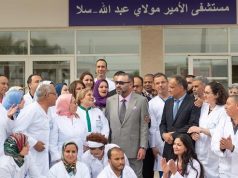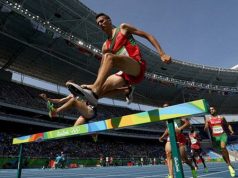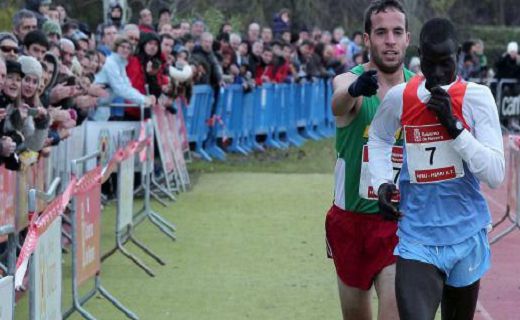
Townsville, Australia (TMT)- You may have heard of the just turned 21-year-old Moroccan runner Nader Belhanbel for the first time as he lined for the 800ms 2015 world championship final in Beijing last September, lining next to Amel Tuca, holder of the 2015 best-performance of the year in said distance, standing only one lane away from 800 meters legend David Rudisha, the emblematic world record holder.
Nader Belhanbel who made it to the final after qualifying indirectly with the second best time in all semi-final series is now dubbed Morocco’s most promising 800 meters runner by his fellow compatriots. Since he started running, his improvement was mesmerizing, every year improving his PB by at least 2 seconds to hit this year a personal best of 1:44:64. And if he keeps on this line of improvement, 1:43, or 1:42 do not seem far away.
![]()
![]() [symple_box color=”white”]Whenever I wanted to skip school to train better, my parents were very strict about studies and always reminded me that studies go first. [/symple_box]
[symple_box color=”white”]Whenever I wanted to skip school to train better, my parents were very strict about studies and always reminded me that studies go first. [/symple_box]


The Moroccan Times picked the young talent for an interview. He gladly shared his insights on his beginnings in his athletics career and threw a spotlight on his short-term goals, among others. Nader was interviewed by Idriss Benarafa.
Idriss: Nader, when did you start running? Who was your inspiration? Was it Hisham El Guerrouj, Said Aouita, Iguider? Or maybe someone else?
Nader: Thank you for having me. My first real-experience with running was in 2009, in the wake of Morocco’s schools national championship, known as Al Alaab Al Madrassiya. I was representing my school of Ain Taoujdat [a tiny pocket of land located between Fes and Meknes]. Back-then, I did run well and finished my race first. An athletics coach from the city of Meknes had his eyes on my performance and invited me to join a Meknes-based athletics club at the end of the event. I was excited and decided to join him, even though it was difficult at the beginning as Ain Taoujdat is located 40 kms away from Meknes and the public transportation in the said village is not that quite developed. I couldn’t join all training sessions because it was too tiring for me to head to Meknes three times to five times a week. Then my coach had this bright idea of writing me every week a program to follow while meeting with him only once a week, mainly to train with the group, to check my workouts and, of course, to hand me next week’s program. I was training individually in Ain Taoujdat, only meeting the team on Saturdays.

Idriss: Was it very difficult to train alone in Ain Taoujdat?
It was very difficult but two years after keeping on this stride, I won the 800 meters Moroccan junior championships. Then life got relatively easier as I was called up right after this achievement by the Moroccan national team. I moved then to live in the capital, Rabat.
Idriss: What about your initial inspiration?
Nader: Regarding my initial inspiration, I may surprise you if I say that it wasn’t Hisham El Guerrouj nor Aouita. It was actually Ali Ezzine, a native of the same town where I was born [Ain Taoujtat]. Ezzine is an Olympic champion as he won in the Sydney Olympics a medal in the 3000 meters steeple chase. In my small town of Ait Taoujtat, everybody knows everybody. It is a very small town and it is like a big family. Ali Ezzine was on the mouth of all the locals and his exploit was known to all. Everybody in Ain Taoujtat was inspiring me whenever they saw me training, telling me you can be the next Ali Ezzine and pushing me to emulate him. Without a shadow of doubt, Ezzine is the main Athlete who inspired me, even though I grew up to learn of Moroccan athletics legends El-Guerrouj, Aouita and all the great things they achieved. Without a shadow of doubt, Hisham also has his share of inspiration on me.
![]() [symple_box color=”white”]
[symple_box color=”white”]![]() Everybody in Ain Taoujtat was inspiring me whenever they saw me training, telling me you can be the next Ali Ezzine and pushing me to emulate him. [/symple_box]
Everybody in Ain Taoujtat was inspiring me whenever they saw me training, telling me you can be the next Ali Ezzine and pushing me to emulate him. [/symple_box]

Idriss Benarafa: How do you cope with studies and training?
Nader: This year I decided to put my studies on hold to give it all for the 2015 Athletics World Championship in Beijing. The years before I was called up by the Moroccan Athletics Federation, it used to be very difficult, especially on the days before the big national competitions. Whenever I wanted to skip school to train better, my parents were very strict about studies and always reminded me that studies go first. Sometimes when training for on-door competitions, I used to sleep during class time. It was very difficult for me to train, go back home to change my clothes, and then head back to school, let alone days where I had to train in Meknes as my coach required me to train with the group to test a race strategy. Sometimes I was at a loss and told myself in the back of my mind that I need to stop studies and focus on running, because that is what I wanted to do. But my parents categorically refused the idea whenever I shared my thoughts with them, always stressing that studies go first. In all truthfulness, my parents were my rock and were always encouraging me. Thanks to them I got my high school degree [Moroccan baccalaureate] in 2012, and then I started my bachelor’s degree for the academic year 2012-2013 at the University of Rabat. This year unfortunately, I had to put it on hold because of the aforementioned reason. I am planning to return back to classes soon. You know it is difficult to study and train when the university does not take into consideration scheduling subjects to fit your training schedule. There is not much choice in terms of subjects schedules as it is not a sport university.

Idriss: Why didn’t you apply for a sport-scholarship at Al-Akhawayn university of Ifrane? It is the only Moroccan university that currently offers the possibility for professional athletes to study while fully focusing on their training? It has also a great sport infrastructure. No need to mention that it is located in high altitude, only meters away from great training spots where El Guerrouj and other leading athletes from all over the world used to train.
Nader: When I was called up by the Moroccan athletics team, I did not have time to think about my studies. I just went to Rabat and started training at the national training center in Rabat. I did not think at all about Al Akhawayn. Back-then, I just thought to enroll at the closest university, a university located in Rabat. Nevertheless, I do hold various training camps in Ifrane, even though if the high-atlas city is more and more losing its forests and running spots to touristic or ecologic projects, which has shrunk running spots considerably.

Idriss: You improved your personal best this year and reached your 2015 goal of making it to the 800 meters final in the world championship in Beijing. What is your goal for next season, especially that it is an Olympics year?
Nader: In 2015, I told myself this year my goal is to make it to the world championship final and I made it. It would have been irrational to set my goal so to win a medal in Beijing. I try to be logical with myself and to plan rationally. Next year, I am planning to improve my personal best, including not just making it to the final of the Olympics game, but to fight for a medal. I know it is a very difficult endeavor, but I’ll do my best.
Idriss: Do you have the motivation that will propel you to reach that goal?
I am motivated psychologically, but in order fulfill my goal, I need to get a lot of support from the Moroccan Athletics federation and my coaches. I hope I could try new training methods this year, methods that will lift my performance. Maybe I should train outside of Morocco with professional athletes. I hope the Moroccan Athletics Federation could help me fulfill this endeavor.

Idriss: Do you recall running for the first time against 800-meters legend and current world record holder David Rudisha? How did it feel?
You know, I used to watch Rudisha at home as a teenage and I saw him doing wonders and writing history live on TV. I always told myself when watching him that I want to be like him. He is just great. The first time I was scheduled to run against him, I was not realizing the moment and it really was a motivational push for me. It was a great moment indeed. Rudisha is a great athlete, and at the same time he is very down to earth. I am impressed by his modesty. Actually, all Kenyan athletes are down to earth and very modest.

Idriss: How is your relation with Mohammed Aman, Amel Tuca, Adam Kszczot, David Rudisha and others?
Outside of the track, we are friends. Inside the track, it is a relation of mutual respect and fair-play. That is what sportsmanship is all about.

Idriss: Nader, Thanks a lot for you time. I wish you all the best in the future. Keep training hard to make Moroccans proud.
Nader: Thank you for having me. It was a great pleasure.
[symple_box]  Idriss Benarafa is the editor-in-chief of The Moroccan Times. Follow @IdrissBenarafa
Idriss Benarafa is the editor-in-chief of The Moroccan Times. Follow @IdrissBenarafa
[/symple_box]
The Moroccan Times.







